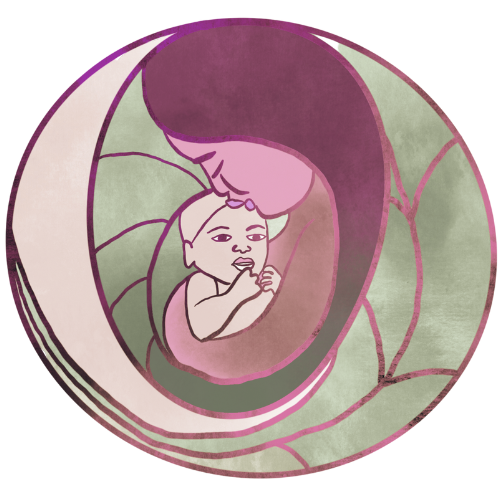What's It Really Like to Have a Midwife Attend Your Birth?
Spoiler alert: It's nothing like the movies.
Close your eyes and picture birth for a moment. If you're like most people, you're seeing hospital gowns under harsh fluorescent lights, people rushing around with clipboards, and machines beeping out a steady rhythm. It looks clinical, hurried, and—if we're being honest—pretty lonely.
But that's not what birth looks like when you work with a midwife.
With a midwife, birth becomes something quieter. More intimate. More yours. It's you, your baby, and someone who's become genuinely invested in your story over the past nine months. We're not there to "deliver" your baby like a package. We're there to witness you doing one of the most powerful things a human body can do—and to make sure you feel supported every step of the way.
It Starts Long Before Labor Day
The real difference begins in those early prenatal appointments.
When you see a midwife, you won't be shuffled in and out in ten minutes flat. Instead, we sit down together. We talk—really talk. Sure, we'll listen to your baby's heartbeat and check all the medical boxes, but we're also checking in with you. How's your sleep? What made you laugh this week? What's that nagging worry that keeps popping up at 2 AM?
These conversations build something precious over time. I learn the small details that matter: whether you prefer your tea with honey, if you crack jokes when you're nervous, or if you're the type who needs a gentle hand on your shoulder when things get intense. By the time labor arrives, I'm not walking into your birth space as a stranger clutching a medical chart. I'm walking in as someone who already knows your story.
That kind of relationship might not sound "medical," but trust me—it's some of the most powerful medicine there is.
The Marathon in the Middle
Let's be real: labor is work. Sometimes it's a sprint—fast and intense. Sometimes it's more like a leisurely hike that just keeps going. My job isn't to rush you along or make it fit some arbitrary timeline. It's to be your steady presence while your body does what it needs to do.
Sometimes that means suggesting you try laboring in the shower. Sometimes it's bringing you ice chips or rubbing your lower back during contractions. Sometimes it's simply being a calm, confident person in the room who isn't fazed by the sounds you're making or the time it's taking.
I'm watching your baby's heart rate, absolutely. But I'm also watching you. I notice when exhaustion starts creeping in, or when your partner is hovering nearby, clearly wanting to help but not sure how. That's when I guide them: "Try pressing here during the next contraction. Hold her hand like this. Breathe with her—she'll follow your rhythm."
Years later, families don't usually remember the exact words I said. What they remember is the feeling: that they weren't being rushed, that someone believed in their ability to birth their baby, that the room felt safe and sacred.
"But What If Something Goes Wrong?"
This is the question I get asked most, and I completely understand why.
Here's what you need to know: midwives are extensively trained for emergencies. We carry medical equipment, we know how to manage complications like excessive bleeding or a baby who needs immediate assistance, and we absolutely know when it's time to transfer to a hospital. If that happens, we don't just call an ambulance and wave goodbye—we come with you and continue advocating for your care.
But here's something else about safety that doesn't get talked about enough: it's not just about handling emergencies. Real safety also means not having unnecessary interventions, not being told your perfectly normal labor is "taking too long," and not feeling scared or pressured during one of life's most vulnerable moments. Creating that kind of emotional safety? That's part of our job too.
The Part Nobody Warns You About
Here's something that surprises a lot of families: midwifery care doesn't end when your baby arrives. Those first few weeks—what we call the "fourth trimester"—can be just as intense as labor itself, just in a completely different way.
That's why we keep showing up. During postpartum visits, yes, I'll check your physical healing and your baby's weight. But I'm also asking the questions that matter: How's breastfeeding going? Have you managed to eat anything besides crackers today? When's the last time you showered? (No judgment—we've all been there.)
Sometimes these visits are about weighing the baby or checking incision sites. But just as often, I'm sitting on your couch at 10 AM, reminding you that feeling overwhelmed doesn't mean you're failing, and that asking for help is actually a sign of strength.
Partners need this support too. Birth affects them in ways they might not expect, and they deserve care and check-ins right alongside you.
Parents consistently tell me these postpartum visits end up being the support they didn't even know they desperately needed.
Sacred and Ordinary, All at Once
Let me clear something up: birth with a midwife isn't some ethereal, Pinterest-perfect experience. You won't be floating on a cloud of lavender essential oils while gentle acoustic music plays in the background.
Birth is sweaty. It's intense. It's hard work—hence the term "labor." But it's your work, happening at your pace, in your space, with your choices honored.
That's what families remember most: not just their beautiful baby, but the way their birth story truly belonged to them.
Midwifery care is about holding space for both truths simultaneously: birth is the most ordinary thing in the world—people have been doing it since the beginning of time—and it's also completely sacred, a transformation that will change you in ways you can't even imagine yet.
If you've been wondering what it's really like, here's the simplest way I can put it: it feels human.
Ready to Learn More?
If you're curious about midwifery care, contact Nets right here. Have a real conversation about your questions, your hopes, and what kind of birth experience feels right for you and your family.
Sometimes the most important step is simply saying your questions out loud.
Frequently Asked Questions
"Do you make everyone have their baby by candlelight with whale songs playing?" Only if that sounds amazing to you! Your birth space should feel like you—whether that means dim lighting and soft music, or bright lights and your favorite podcast. There's no "right" way to create a birth environment.
"If I decide I want an epidural, will you think I'm weak?" Absolutely not. Pain relief is a tool, not a test of your character. My job is to support whatever choices feel right for you, not to grade your performance.
"Does my partner have to catch the baby?" Only if they want to! Some partners love the idea, others prefer to stay up by your head offering support. There's no participation trophy here—just whatever feels right for your family.
"What actually happens if something goes wrong?" We act quickly and decisively, and we don't abandon you. If we need to transfer to a hospital, we stay with you throughout the process, advocating for your wishes and ensuring continuity of care.
"Do midwives only do home births?" Nope! Midwives work in all kinds of settings—homes, birth centers, and hospitals. The location matters less than finding a midwife whose philosophy aligns with your values and whose presence makes you feel confident and supported.
"Will you judge my birth playlist?" Never. Whether you want classical music, death metal, or complete silence, I'm here for it. Your birth, your soundtrack.

